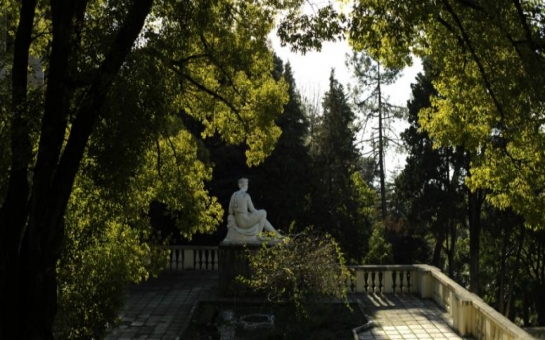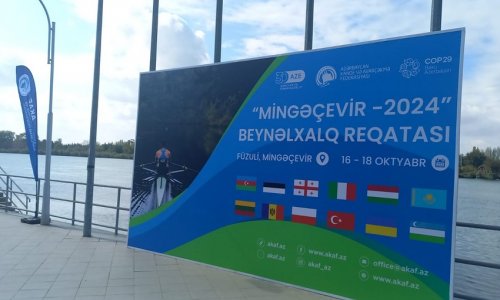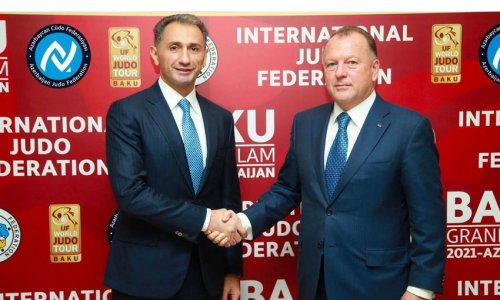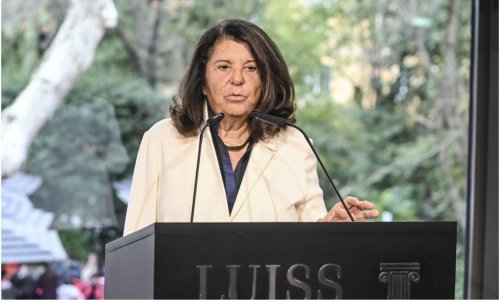Most visitors to the Winter Olympics will only see the giant stadiums and overpriced hotels. But some Russians are mourning the lost paradise of childhood.
SOCHI — The morning sun painted the ceiling of our grape gazebo in gentle shades of green. I remember it well. On sunny days, the contours of the cypress trees stood out starkly, as if drawn along the coast: they formed a live fence stretching along the five-kilometer footpath at the bottom of the hill, seaside Sochi's equivalent of a Jersey boardwalk. I liked to climb to the top of a marble statue of a giant lion, where I'd sit and stare out at the gently heaving expanse of the Black Sea, or teeter along the edge of a big fountain decorated with nude statues of goddesses as I watched the East German tourists stroll along the cypress-lined alley in their white linen suits. And then there was that old, heavy grapevine that drooped down next to a pool filled with red fish in the Iskra Spa Hotel. My mother discovered that living armchair when she was a little girl, and later she shared it with me. Her grapevine became my favorite hideaway during the many summers I spent in Sochi as a kid. Swinging on it, I often closed my eyes and said to myself: "Try to remember this moment of ultimate happiness."These memories came back to me the other day, as we were driving at freeway speed down the coast along a new, perfectly illuminated, and surprisingly empty four-lane road toward the Olympic venues. An unrecognizable new Sochi in asphalt and concrete, now nicknamed "Putin's project," rose before us in the quiet evening light. The dust from Olympic construction had finally settled, along with the clanging, rasping noise of construction equipment, the daily sound track of the past four years. Sochi seemed still and deserted, as if the town itself was startled by its giant new facades, its massive bridges, its tunnels and roads.Sochi seemed still and deserted, as if the town itself was startled by its giant new facades, its massive bridges, its tunnels and roads.This Friday, on the day of Olympic opening, Russia's state-owned Channel One will broadcast a film about the man who has taken full personal responsibility for transforming the city and bringing the world to Sochi: "I'm particularly pleased to see what's happening here because I personally chose this place," says President Vladimir Putin in the film. We have no reason to doubt him. So what are the subtexts, the personal motives, the secret codes revealed to us by the image of this new Sochi that owes its existence to the president?Until recently, locals referred to Sochi as the country's main zdravnitsa, a healthy place to breathe, sunbathe, soak in sulfur baths, and rest your spirit and soul. Back when Putin's reign was just getting under way, the idea of coming to Sochi, a place strongly associated with Soviet-era tourism, looked relatively unattractive to Russians eager to take their first package trips to Egypt or Turkey. More recently, though, the cash being pumped into the world's most expensive Olympic construction project has drawn huge numbers of migrant workers, swelling the city's population by almost two-thirds, to half a million people. Moscow investors snatched up real estate in the historic downtown area, the suburbs, and the forests, while experts debated what would become of the place.Local historian Sergei Shcherbakov has never welcomed the invasion of Moscow's money and power into Sochi's dreamy world. "Putin's Sochi has become Russia's Las Vegas, where, as if in a giant smelter, each square meter of Sochi's land has been either lost or turned into dollars," Shcherbakov told me recently. Alla Guseva, a manager of Sochi's historic museum, said that it's too early to forecast the fate of post-Olympic Sochi. "Stalin built a utopian but successful resort to show off Soviet happiness," she told me. "It's too early for us historians to predict Sochi's future. We'll have to let at least five years pass by before we can see whether the city continues to progress. For now its status is unclear."Stalin had an ideological agenda for Sochi: he built neo-classical palaces in his Soviet Riviera in the 1930s to make the capitalist West green with envy. Local sulfur baths helped the dictator boost his constantly fading health. He ordered his star commissars to plant botanical gardens and create showcase resorts for the working class as way of demonstrating to the world that it was also possible to enjoy the dolce vita under Communism. Any Olympic visitors who want to get a sense of what he created should take a break from sports and take a taxi over to the old Kurortny Prospect, in the old city.The five-kilometer long pedestrian footpath is still there, hidden behind the forest of rapidly growing skyscrapers. Most of the old romantic corners of the city, though, have fallen victim to the Olympic boom -- along with the milk factory that was once one of the city's proudest landmarks. It was especially appreciated by French visitors, who were big lovers of its delicious ice cream. (Yes, there were Western tourists even in the old days, too.) In spite of public protests by residents, the wave of construction has also rolled over Gastronom No. 1, the city's most famous Soviet-era grocery store. On a recent afternoon, Magomed and Ali, two Dagestani construction workers who've been participating in a makeover of the Iskra Hotel, showed me what has become of my once favorite hideaway. The building looks much the same, but my favorite grapevine has vanished, along with the red fish.As the Olympic deadline neared, the authorities, resorting to their traditional habits, used colorful sheet metal walls to cover the signs of decay along the newly opened freeway to the site of the Games. Even the huge sulfur baths of the old Matsesta Resort, ruined by a flooding river some 20 years ago, were wrapped up in a surreal curtain adorned with paintings of mountains. The Ordzhonikidze Resort, a magnificent palace that once served as the city's calling card, continues to fall apart -- except for the two freshly painted statues at the entrance facing the road. (The rumor is that the Kremlin took over the palace as a vacation retreat for the president's staff, but ran out of money before the project was completed.) Most local people have long since had enough of Putin's Project: the endless Olympic construction, accompanied by corruption, displacement, and environmental damage. Over and over I've heard the same sentiment from the mouths of the residents: "We're tired," they say. "We just wish the Games were over."Over and over I've heard the same sentiment from the mouths of the residents: "We're tired," they say. "We just wish the Games were over.""Waiting for the Olympics" has been Sochi's mantra for the past eight years. In Moscow and St. Petersburg, meanwhile, there is much speculation that the end of the Olympics will mark the start of a new official onslaught against the opposition. In the North Caucasus republics adjoining Sochi, the fear is of something even more sinister: a big military crackdown. Kheda Saratova, an activist in the Chechen capital of Grozny, told me that she and many others are deeply worried by the prospect of a terrorist attack at the Games. "If, God forbid, insurgents blow up a bomb in Sochi, we're afraid there will be another war," she said. "So many people are delaying their business investments until after the Olympics."Not everyone is worried, though. On the day the Olympic torch relay neared Sochi, I paid a visit to the home of a happy family of Olympic fans. I found Anastasia Vinogradova and her family on Aviatsionnaya Avenue, just 15 minutes from the Olympic Park by car. Since the late 1970s, the Vinogradovs and their neighbors have been living in railroad cars that have been turned into houses. Surviving together in poor conditions, without central heating or hot water, the Aviatsionnaya neighborhood created a warm community of good friends and faithful troopers.Over the years the Vinogradovs have appealed to the authorities to improve their living conditions. They've gone to court to obtain proof that their railroad car home actually belongs to them. But the courts lost their paperwork, and the case fell apart. These days the Vinogradovs have decided to simply enjoy what life is offering them. The family introduced themselves to me as tough Sochi survivors, people who don't expect the state to provide them with compensation for the hardships the Olympics have brought to their city. They've chosen to embrace the Games out of a sincere love of sports. As Anastasia and her husband proudly showed me the Russian flag they're planning to bring to the Olympic figure skating competition, their daughter climbed out of bed into her father's arms. In a few days she'll be sitting between her parents on a stadium bench, watching the best skaters in the world do their thing. I wish her the sort of memories that last a lifetime.(foreignpolicy.com)ANN.Az
Follow us !











